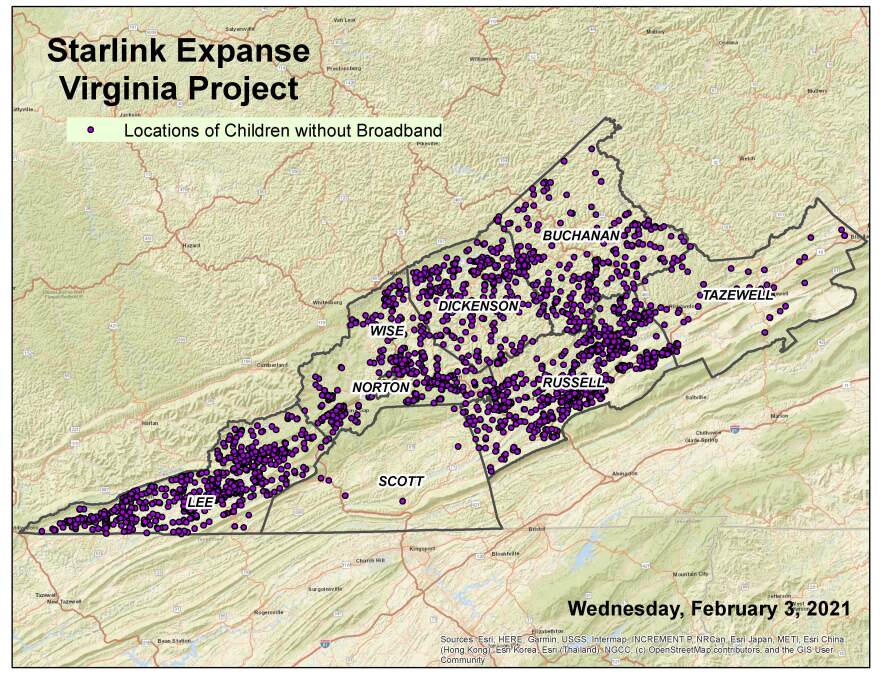In what’s quickly becoming a virtual world, students with no or slow internet are being left behind.
So, school administrators in rural Wise County reached out to Elon Musk’s SpaceX.
Now, households in the mountains of southwest Virginia are helping beta test broadband internet from space.
It seems like overnight students everywhere were learning virtually. In reality it wasn’t overnight and it wasn’t students everywhere.
“It was about a month into home schooling, to virtual learning” says Brandon Short, “and the kids are having a tough time. My wife's having a tough time. She called me. She was frustrated.”
Short lives in southwest Virginia. He’s an account manager for a finance company. He and his wife have three children. With no internet at home, the work-arounds for getting school work done just weren’t cutting it.
“It'd be like, my oldest child would do his work in the morning and then in the afternoon, my middle child would do his work. because two on that hotspot at the same time was tough.”
Short says costs for high-speed internet to his property would be thousands of dollars, more than the family could afford. Costs to run internet in sparsely populated places are often sky high. But their two school aged children could not keep working off a telephone hot spot or parked outside a fast-food restaurant to use the Wi-Fi for schoolwork.
If the pandemic has shown us anything, it’s that virtual communications, like Zoom or Skype calls, are here to stay. As it stands, that pushes rural places where the numbers don’t ‘make sense’ for terrestrial Internet even further behind 21st Century standards.
Billy Markham is an analyst for Ballad Health System in Wise. He also has a son in the county’s school system and no broadband at home.
“It’s 2021 and I think affordable internet that's reliable is almost a necessity, the same as electricity is a necessity. I mean, technology is growing so fast. We're playing checkers and everybody else is playing chess. We’re just falling behind.”
But a couple of weeks ago, Markham had a small package delivered to his house.
“They installed the Starlink,” he tells me. “So far, I'm really impressed with it. My my son has had a lot better outcome with it.”
Markham says, all they had to do was take the small device out of the box and plug it in, and they have had as many as five devices plugged into it, with no problem.
Because satellites continuously orbit earth, as they move through, more replace them. There is sometimes a brief latency as a satellite drops out of range, but no one’s complaining about it.
“You know, our area is really poverty stricken already,” says Markham. "And you know, it'd be great if we could see some kind of funding, state level or federal funding, some kind of grant money to pass this on to numerous other families that can't afford it.”
Right now, 45 households in Wise are helping beta test the Starlink system. SpaceX satellites in low earth orbit are beam high speed internet down to school students in the mountains of southern Appalachia.
Markham is glad of the changes he hopes will come. “My dad was a coal miner, and my grandad was a coal miner. And, you know, the coal mines are pretty much a thing of the past.”
Markham believes it’s technology that will bring new kinds jobs.
“We would see this available to every, every kid, no matter what hilltop they were on or what holler they were living in, would have the same opportunity as every other child and have this Starlink available to them.
It's not the first time Wise County Schools have been to space, so to speak.
In 2019, students won a competition to send a payload into low earth orbit with a company called Firefly Aerospace. A loosely organized group of, dedicated teachers, administrators, Senators and space buffs have kept Wise County students’ eyes on the skies for years now.
Their next reach?
Inviting Elon Musk to visit them in Wise County, a place that’s struggling, where coal is on the wane, and broadband from satellites, on the rise.

